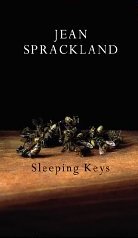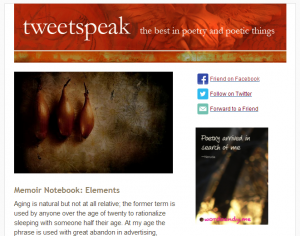We all have a box or something like a box, perhaps more than one, filled with old coins, paper clips, the combinations to locks thrown away years ago, extra screws for the floor lamp we bought at Target (some assembly required), and old keys to vaguely remembered locks. Rather useless stuff, really, but we can’t quite bring ourselves to throw it all away. Something might be hidden away among the jumble.
Those Sleeping Keys constitute the subject of the title poem in poet Jean Sprackland’s new collection, published earlier this year:

there’s a biscuit tin like this in every house.
Prise off the lid and catch the flinty scent
of old keys, decommissioned and sleeping.
Like unspent francs, deutschmarks and drachmas
they accumulate here, inert and futureless,
though each in its time was powerful:
precision-cut on a wheel of sparks.
Tip them out on the table in the empty kitchen
and rake through them one last time.
The mortice for the first front door,
The yale for the porch, replaced ten years ago
(never a good copy, it balked at the turn).
These antiques were for internal doors,
this one perhaps the old bathroom where
he knocked softly, and you stepped out of the bath
and printed the bare boards with your feet
as you hurried to unlock and let him in.
Padlock keys for sheds and bikes, and a set
with a jaunty tag for the house next door, though
the people are different now and you can’t imagine
popping round and watering the plants.
Count out their obsolete treasure on the table,
Puzzling as your grandmother’s brooches and hatpins
and with the same residual gravity —
the shiny, the worn, the ones threaded
on strong or paperclips, or marked with Tipp-Ex,
the miniatures for medicine cabinets and pianos —
then scoop the lot into the bin, because
not one will ever spring a lock again
to let him into your space, or you to his.
No more the easy click of the blade engaging
and nudging the bolt aside, or his grin as he entered
the room of steam, already slipping off his shirt.
The metaphor of sleeping keys shapes the poems in the collection, whether they are about life, love, a garden, a mother dying. These memories lie jumbled together, possibly valuable or possibly not, quietly awaiting the opening of the lid, prompted by a thought, a memory, a letter.

For that is what Sleeping Keys is largely about: memory and memories, how they shape who we are and how they can often lie fallow, waiting for the inspiration to emerge, for the moment to become real again. Or they may remain in the biscuit box, forever forgotten and never recalled.
Sprackland is senior lecturer in creative writing at Manchester Metropolitan University and a trustee of the Poetry Archive, “the world’s premier online collection of recordings of poets reading their work.” She’s won the Costa Poetry Award (2008) and the Portico Prize for non-fiction (2012), and been shortlisted for the Forward Prize and the T.S. Eliot Prize.
Sleeping Keys is a quiet collection, yet underscores the importance of what lies unrecognized and forgotten in our lives. Forgotten, perhaps, but important nonetheless.
Image by noone. Sourced via Flickr. Post by Glynn Young, author of the novels Dancing Priest and A Light Shining.
___________________________
Subscribe to our free weekly newsletter.
We’ll make your Saturdays happy with a regular delivery of the best in poetry and poetic things.
Need a little convincing? Enjoy a free sample.
- Poets and Poems: Luke Harvey and “Let’s Call It Home” - January 21, 2025
- Epigrams and Epitaphs: Martin Armstrong and “Fifty-Four Conceits” - January 16, 2025
- Poets and Poems: Michael Favala Goldman and “Destinations” - January 14, 2025


Maureen Doallas says
Lovely review, Glynn.
I like the idea and use of key as metaphor.
We not only have “orphan” keys in drawers but keys to neighbors’ homes (they’re always locking themselves out).
nance.mdr says
cigar box
kitchen drawer
cardboard box
children’s drawings
and little love notes
letters
photographs of
relative strangers